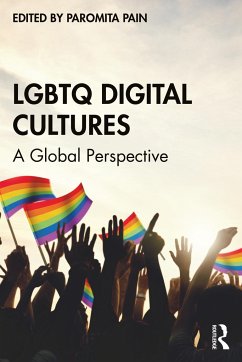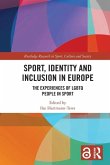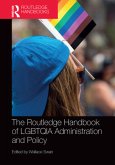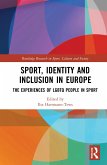Emphasizing an intersectional and transnational approach, this collection examines how social media and digital technologies have impacted the sphere of LGBTQ activism, advocacy, education, empowerment, identity, protest, and self-expression.
This edited collection adopts a critical and cultural studies perspective to examine queer cyberculture and presence. Through the lens of representation and identity politics, it explores topics such as race, disability, and colonialism, alongside sexuality and gender. The collection examines how digital technologies have made queer cultural production more expansive and how such technological affordances and platforms have enabled queer cultural practices to be more transformational. Bringing together contributors and case studies from different countries, the contributions grapple with the tensions that arise when visibility, hiddenness, renditions of the self, and collective contractions of identity must be negotiated in a variety of global contexts and explores this influence on contemporary political identities.
This book provides an essential introduction to LGBTQ digital cultures for students, researchers, and scholars of media, communication, and cultural studies. It will also be of interest to activists wanting to learn more about the transformative potential of digital media and technology in LGBTQ advocacy and empowerment around the globe.
This edited collection adopts a critical and cultural studies perspective to examine queer cyberculture and presence. Through the lens of representation and identity politics, it explores topics such as race, disability, and colonialism, alongside sexuality and gender. The collection examines how digital technologies have made queer cultural production more expansive and how such technological affordances and platforms have enabled queer cultural practices to be more transformational. Bringing together contributors and case studies from different countries, the contributions grapple with the tensions that arise when visibility, hiddenness, renditions of the self, and collective contractions of identity must be negotiated in a variety of global contexts and explores this influence on contemporary political identities.
This book provides an essential introduction to LGBTQ digital cultures for students, researchers, and scholars of media, communication, and cultural studies. It will also be of interest to activists wanting to learn more about the transformative potential of digital media and technology in LGBTQ advocacy and empowerment around the globe.
"With chapters employing theoretical frameworks and methodological approaches from across the humanities and social sciences, and excavating the cultural particularities of a dozen countries, this volume offers a rich exploration of the powers and limits of digital media for queer world-making from a global perspective. This book will be an essential resource for students and scholars of LGBTQ media and culture alike."
Thomas J Billard, Assistant Professor of Communication Studies at Northwestern University and Executive Director of the Center for Applied Transgender Studies, USA
"An important collection that theoretically and methodologically expands the current states of both LGBTQ Studies and Media and Communication Studies. It explicitly examines intersections among LGBTQ, digital media, and cultures. Most importantly, the chapters included take cutting-edge approaches to study contemporary issues and concerns in and across LGBTQ digital cultures."
Shinsuke Eguchi, Associate Professor of Communication, University of New Mexico, USA
"LGBTQ Digital Cultures offers an important and much-need international framework for exploring the implications of contemporary digital media for queer and transgender people across the globe. The chapters bring critical new insights to discussions about digital activism, platform politics, and the ways that LGBTQ communities can be both empowered and disenfranchised by technology."
Bonnie (Bo) Ruberg, Assistant Professor, Film & Media Studies, University of California, Irvine, USA
"A 'coming out' of scholarship about LGBTQIA+ identities on social media and digital platforms beyond US/Western perspectives is well overdue. Drawing from researchers, advocates, and activists, this volume provides a global, intersectional view of the ways that sexual and gender minorities engage in queer world-building, activism, and empowerment"
Nikki Usher, Associate Professor, Department of Journalism, University of Illinois Urbana-Champaign, USA
"This collection is an invaluable addition to the growing literature on trans and queer digital cultures. Spanning multiple world regions and including contributions from activists and academics, it offers unique intersectional and transnational perspectives on the paradoxical role that social media play for LGBTQ communities. In doing so, the book advances the much-needed project of dewesternisation and decolonisation of media and communication studies."
Lukasz Szulc, Lecturer in Digital Media and Society, University of Sheffield, UK
"This edited volume dives into ambitious intersectional approaches which examine queer digital cultures and their productively messy overlaps with race, gender, disability, and national contexts. Dr. Paromita Pain and her contributors offer a refreshing, current, and much needed book that consistently foregrounds LGBTQIA+ lenses on digital and social media production, representation, and usage across the globe."
Stine Eckert, Associate Professor, Department of Communication, Wayne State University, USA
"This powerful and timely collection of emerging and re-envisioned theories and studies from around the world is an important and critical contribution to scholarship centered on the influence of social and digital cultures on LGBTQ identity, advocacy work and expression. This compelling volume is truly intersectional in nature and offers scholars, students and other perspectives that are transformational."
Jeannine E. Relly, Professor, School of Government and Public Policy, Member of the Graduate Faculty, University of Arizona, USA
Thomas J Billard, Assistant Professor of Communication Studies at Northwestern University and Executive Director of the Center for Applied Transgender Studies, USA
"An important collection that theoretically and methodologically expands the current states of both LGBTQ Studies and Media and Communication Studies. It explicitly examines intersections among LGBTQ, digital media, and cultures. Most importantly, the chapters included take cutting-edge approaches to study contemporary issues and concerns in and across LGBTQ digital cultures."
Shinsuke Eguchi, Associate Professor of Communication, University of New Mexico, USA
"LGBTQ Digital Cultures offers an important and much-need international framework for exploring the implications of contemporary digital media for queer and transgender people across the globe. The chapters bring critical new insights to discussions about digital activism, platform politics, and the ways that LGBTQ communities can be both empowered and disenfranchised by technology."
Bonnie (Bo) Ruberg, Assistant Professor, Film & Media Studies, University of California, Irvine, USA
"A 'coming out' of scholarship about LGBTQIA+ identities on social media and digital platforms beyond US/Western perspectives is well overdue. Drawing from researchers, advocates, and activists, this volume provides a global, intersectional view of the ways that sexual and gender minorities engage in queer world-building, activism, and empowerment"
Nikki Usher, Associate Professor, Department of Journalism, University of Illinois Urbana-Champaign, USA
"This collection is an invaluable addition to the growing literature on trans and queer digital cultures. Spanning multiple world regions and including contributions from activists and academics, it offers unique intersectional and transnational perspectives on the paradoxical role that social media play for LGBTQ communities. In doing so, the book advances the much-needed project of dewesternisation and decolonisation of media and communication studies."
Lukasz Szulc, Lecturer in Digital Media and Society, University of Sheffield, UK
"This edited volume dives into ambitious intersectional approaches which examine queer digital cultures and their productively messy overlaps with race, gender, disability, and national contexts. Dr. Paromita Pain and her contributors offer a refreshing, current, and much needed book that consistently foregrounds LGBTQIA+ lenses on digital and social media production, representation, and usage across the globe."
Stine Eckert, Associate Professor, Department of Communication, Wayne State University, USA
"This powerful and timely collection of emerging and re-envisioned theories and studies from around the world is an important and critical contribution to scholarship centered on the influence of social and digital cultures on LGBTQ identity, advocacy work and expression. This compelling volume is truly intersectional in nature and offers scholars, students and other perspectives that are transformational."
Jeannine E. Relly, Professor, School of Government and Public Policy, Member of the Graduate Faculty, University of Arizona, USA








